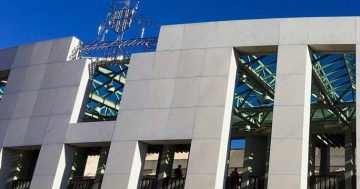
APSC Deputy Commissioner Peter Riordan: “We are committed to good faith bargaining and to undertaking APS bargaining as quickly as possible.” Photo: Supplied.
Formal bargaining for improved pay and conditions for Australian Public Servants is about to get underway in earnest.
From next month, agencies across the APS will begin negotiations directly with the Australian Public Service Commission’s workplace relations bargaining task force.
Consultations have been taking place since October last year, but the pointy end of APS-wide bargaining has arrived.
“The task force is well advanced in its preparations and its consultation with agencies and employees,” APSC deputy commissioner Peter Riordan said.
“We are ready and we are committed to making this process one that is employee focused, consultative and helps position the APS as a model employer.”
About 30 per cent of the APS workforce took part in a taskforce survey which closed on 3 February. It found pay scales, flexibility and leave entitlements were the top three concerns for staff, who wanted the conditions standardised.
From here, sector-wide bargaining aims to find ways to make pay and conditions more consistent across the APS. There is also room in the bargaining framework for agency-specific conditions to be negotiated.
“We are committed to good faith bargaining and to undertaking APS bargaining as quickly as possible,” Mr Riordan said.
“We look forward to working with employee representatives and unions in coming months.”
Since its formation in October, the Workplace Relations Bargaining Taskforce has been developing an approach to APS bargaining it says will be fair, consultative and employee-focused.
It has already engaged in consultation with a broad range of staff across the APS and insists it is committed to working closely with agencies to ensure staff are kept informed and supported throughout the process.
The task force will communicate directly with staff via regular newsletters and a website.
While bargaining is underway, current enterprise agreements or industrial instruments in individual agencies will continue to operate until a new enterprise agreement is in place.
Public Service Minister Katy Gallagher promised most employees an APS-wide interim 3 per cent pay increase while more permanent workplace arrangements are negotiated.
But in the face of union criticism, she has conceded that 3 per cent is not a real pay rise.
“No, it’s not a real wage increase and we haven’t pretended it is,” Senator Gallagher said late last year.
“Obviously, with inflation where it is, I don’t think anyone’s pretending we would be offering wages in the order of 6 or 7 per cent. But we want to be a model employer. We want to be able to attract people to the public service.”
Tax commissioner Chris Jordan asked the Minister to make his 20,000 employees an exception and give them an immediate 1 per cent pay rise in the interim.
His request found support from the Australian Services Union, but the Minister said no.
“While I acknowledge the workforce pressures being experienced by the ATO and numerous other APS agencies, I do not consider the ATO’s circumstances exceptional and, as such, do not intend to make an exemption for the ATO at this time,” Senator Gallagher wrote the union.
“It is my view that these workforce pressures will be best remediated by restoring the ability of the APS to collectively bargain for improved terms and conditions, consistent with the government’s broader reform plan.”
Meanwhile, the government is preparing to introduce legislation in the second half of this year to amend the Public Service Act – the first time since 1999.
Government reforms will see much of the Thodey Review implemented and push for a new-look public service.
Since forming government, Labor has insisted it wants to reshape the APS to be more transparent, with higher levels of integrity, and less reliance on external contractors and consultants.



















